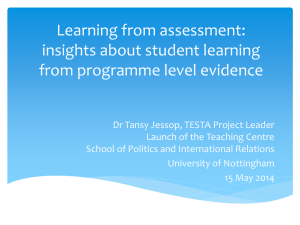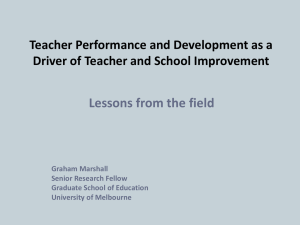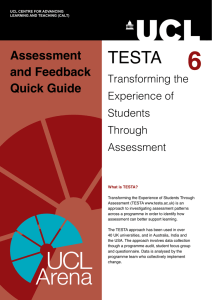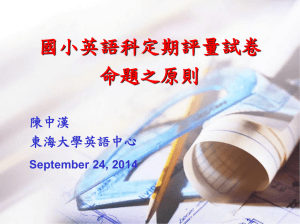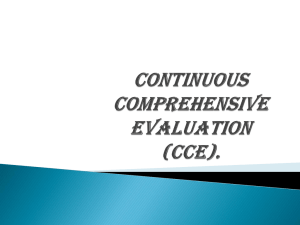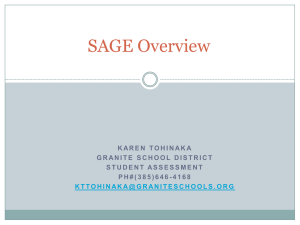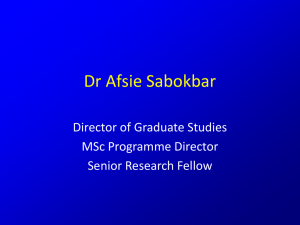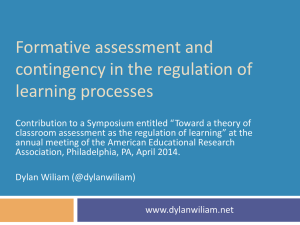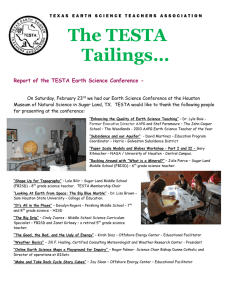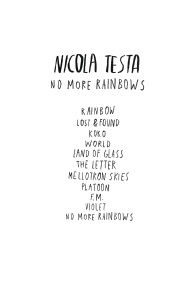Tansy Jessop`s Slides - December 2014
advertisement
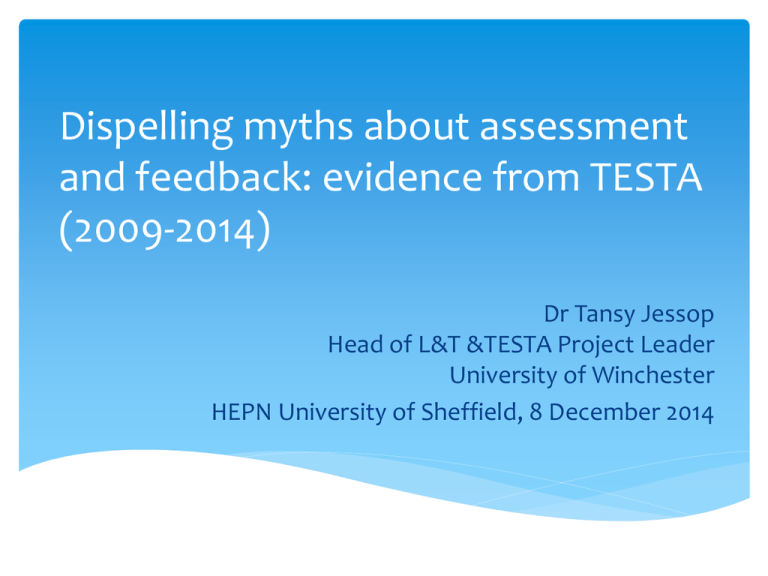
Dispelling myths about assessment and feedback: evidence from TESTA (2009-2014) Dr Tansy Jessop Head of L&T &TESTA Project Leader University of Winchester HEPN University of Sheffield, 8 December 2014 Myths about assessment and feedback Sisyphus rolls a boulder up a hill “an eternity of endless labour, useless effort and frustration” Homer, 8th Century BC 21st century equivalent “You end up assessing for assessment’s sake rather than thinking about what the assessment is for…” Programme Leader, Winchester (2008) Three TESTA premises 1) Assessment drives what students pay attention to, and defines the actual curriculum (Ramsden 1992). 2) Feedback is significant (Hattie, 2009; Black and Wiliam, 1998) 3) Programme is central to influencing change. What is TESTA? Transforming the Experience of Students through Assessment 200k HEA funded research project (2009-12) 7 programmes in 4‘Cathedrals Group’ universities Evidence-based research and change process Assessment through a programme lens Based on assessment principles Edinburgh Southampton Canterbury Christchurch Edinburgh Napier Exeter Glasgow Greenwich Sheffield Hallam University of West Scotland Lady Irwin College University of Delhi Oxford Brookes TESTA Research Methods (Drawing on Gibbs and Dunbar-Goddet, 2008,2009) PROGRAMME AUDITS ASSESSMENT EXPERIENCE QUESTIONNAIRES FOCUS GROUPS Programme Team Meeting TESTA project data > 50 programme audits in 15 UK universities > 2000 Assessment Experience Questionnaires (AEQs) > 70 focus groups Mainly UK data, but includes two Indian universities and one faculty in Australia Four myths… Myth 1: Modules and semesters help students to learn better The weak spot? What students say… It’s difficult because your assignments are so detached from the next one you do for that subject. They don’t relate to each other. Because it’s at the end of the module, it doesn’t feed into our future work. We don’t get much time to think. We finish one assignment and the next one is knocking at the door. In the annual system the lecturers say that they had more time to explain in detail. …about shared practices You’ll get really detailed, really commenting feedback from one tutor and the next tutor will just say ‘Well done’. Some of the lecturers are really good at feedback and others don’t write feedback, and they seem to mark differently. One person will tell you to reference one way and the other one tells you something completely different. …about shared standards Every lecturer is marking it differently, which confuses people. We’ve got two tutors- one marks completely differently to the other and it’s pot luck which one you get. They have different criteria, they build up their own criteria. Q: If you could change one thing to improve what would it be? A: More consistent marking, more consistency across everything and that they would talk to each other. How can assessment and feedback help to join the dots? Evidence to action: TESTA changes 1) More over-arching ‘integrated’ assessments across related modules 2) Fewer small summative assessments ‘miniaturising’ learning 3) More linked assessments (with feedback feeding forward) 4) Strengthening team approaches to marking through cover sheets and mentoring 5) Team calibration workshops Myth 2: Assessment is mainly about grading Hercules attacked the many heads of the hydra, but as soon as he smashed one head, two more would burst forth in its place! Peisander 600BC Audit data Range of UK summative assessment 12-68 over three years Indian and NZ universities – 100s of small assessments – busywork, grading as ‘pedagogies of control’ An ‘assessment arms race’ (Tony Harland) Average in UK about two per module More testing and grading = more learning? A student’s lecture to professors The best approach from the student’s perspective is to focus on concepts. I’m sorry to break it to you, but your students are not going to remember 90 per cent – possibly 99 per cent – of what you teach them unless it’s conceptual…. when broad, overarching connections are made, education occurs. Most details are only a necessary means to that end. http://www.timeshighereducation.co.uk/features/a-studentslecture-to-professors/2013238.fullarticle#.U3orx_f9xWc.twitter What students say… A lot of people don’t do wider reading. You just focus on your essay question. I always find myself going to the library and going ‘These are the books related to this essay’ and that’s it. Although you learn a lot more than you would if you were revising for an exam, because you have to do wider research and stuff, you still don’t do research really unless it’s directly related to essays. Unless I find it interesting I will rarely do anything else on it because I haven’t got the time. Even though I haven’t anything to do, I don’t have the time, I have jobs to do and I have to go to work and stuff. Reading for a degree? (Tony Harland, University of Otago) Evidence to Action: TESTA changes Reducing summative assessments Increasing the level of challenge of summative tasks Increasing required and meaningful formative assessment Encouraging students to produce writing more often in varied formats, and not for marks… Myth 3: Formative assessment is too difficult to do, and not worth doing Defining formative assessment “Definitional fuzziness” Mantz Yorke (2003) Basic idea is simple – to contribute to student learning through the provision of information about performance (Yorke, 2003). A fine tuning mechanism for how and what we learn (Boud 2000) TESTA’s definition of formative Ungraded, required and eliciting feedback What students say about formative tasks… It was really useful. We were assessed on it but we weren’t officially given a grade, but they did give us feedback on how we did. It didn’t actually count so that helped quite a lot because it was just a practice and didn’t really matter what we did and we could learn from mistakes so that was quite useful. He’s such a better essay writer because he’s constantly writing. And we don’t, especially in the first year when we really don’t have anything to do. The amount of times formative assignments could have taken place… What prevents students from doing formative tasks… If there weren’t loads of other assessments, I’d do it. If there are no actual consequences of not doing it, most students are going to sit in the bar. It’s good to know you’re being graded because you take it more seriously. I would probably work for tasks, but for a lot of people, if it’s not going to count towards your degree, why bother? Research to Action: TESTA changes Increase formative assessment Require formative tasks, using QA processes Use public domain to motivate students to undertake formative tasks (presentations, posters, blogs) Use authentic and challenging tasks linked to research, case studies and large projects Multi-stage tasks – formative to summative Set expectations about formative in first year Send consistent messages as a programme team Myth 4: Students are passive ‘victims’ of a (written) feedback monologue Students say… I read it and think “Well, that’s fine but I’ve already handed it in now and got the mark. It’s too late”. I read through it when I get it and that’s about it really. They all go in a little folder and I don’t look at them again most of the time. It’s mostly the mark really that you look for. I’m personally really bad at reading feedback. I’m the kind of person, and I hate to admit it, but I’ll look at the mark and then be like ‘well stuff it, I can’t do anything about it’. Which educational paradigm is feedback in? Transmission Model Social Constructivist model TESTA changes based on evidence Feedback first, marks later Developing dialogue through cover sheets Students initiating feedback through questions Technology to personalise feedback Braving more peer and self-assessment Impacts at Winchester Improvements in NSS scores on A&F – from bottom quartile in 2009 to top quartile in 2013 Programme teams are talking about A&F and pedagogy Course design processes are changing Periodic review includes using the TESTA process (cf. Coventry, Keele, York, Dundee etc) www.testa.ac.uk References Becker, H. (1968) Making the grade: the academic side of college life. Boud, D. (2000) Sustainable Assessment: Rethinking assessment for the learning society, Studies in Continuing Education, 22: 2, 151 — 167. Gibbs, G. & Simpson, C. (2004) Conditions under which assessment supports students' learning. Learning and Teaching in Higher Education. 1(1): 3-31. Gibbs, G. & Dunbar-Goddet, H. (2009). Characterising programme-level assessment environments that support learning. Assessment & Evaluation in Higher Education. 34,4: 481-489. Harland, T. et al. (2014) An Assessment Arms Race and its fallout: high-stakes grading and the case for slow scholarship. Assessment and Evaluation inn Higher Education. http://www.tandfonline.com/doi/abs/10.1080/02602938.2014.931927 Hattie, J. (2007) The Power of Feedback. Review of Educational Research. 77(1) 81-112. Jessop, T. and Maleckar, B. (2014). The Influence of disciplinary assessment patterns on student learning: a comparative study. Studies in Higher Education. Published Online 27 August 2014 http://www.tandfonline.com/doi/abs/10.1080/03075079.2014.943170 Jessop, T. , El Hakim, Y. and Gibbs, G. (2014) The whole is greater than the sum of its parts: a large-scale study of students’ learning in response to different assessment patterns. Assessment and Evaluation in Higher Education. 39(1) 73-88. Jessop, T, McNab, N & Gubby, L. (2012) Mind the gap: An analysis of how quality assurance processes influence programme assessment patterns. Active Learning in Higher Education. 13(3). 143-154. Jessop, T. El Hakim, Y. and Gibbs, G. (2011) Research Inspiring Change. Educational Developments. 12(4) 12-15. Nicol, D. (2010) From monologue to dialogue: improving written feedback processes in mass higher education, Assessment & Evaluation in Higher Education, 35: 5, 501 – 517 Sadler, D.R. (1989) Formative assessment and the design of instructional systems, Instructional Science, 18, 119-144.
